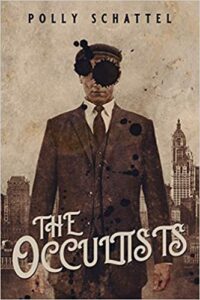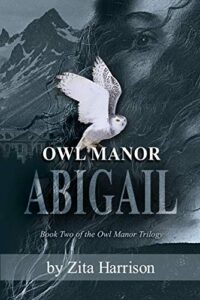The Occultists by Polly Schattel
Journalstone, 2020
ISBN-13 : 978-1950305445
Available: Paperback, Kindle edition
The Occultists is historical horror fiction involving the occult and spiritualist movements active in the early 20th century. When fifteen year old Max Grahame took a job as a postal boy in his small town in Georgia, he had no idea where it would lead. Carrying a box of dead letters to a storage space, he discovers an occult library. The postmaster and his wife are secretive and eccentric, but they are also kind to Max, and introduce him to their friend, Lillian Hearst, who hires him to work at a spirtualist gathering. When Max’s abusive stepfather learns about it, he forbids Max from attending another meeting of occultists, and when Max attends despite this, his stepfather disrupts the meeting and drags him home. That night, Max’s stepfather is brutally murdered in his living room, with Max an inadvertent witness. When Max learns he is the primary suspect, he escapes to beg the postmaster for help. The postmaster, along with Lillian Hearst and her sisters, offer to hide him by sending him to an academy run by their occult order in an isloated area of Nebraska. With few choices available to him, Max agrees to go to Steppeford.
This is where I expected the story to really take off, but it begins to ramble. Max spends long periods of time by himself, as the limited number of students and staff have been instructed to severely limit their interactions with each other. Schattel devotes pages to describing Max’s slow development of his psychic powers, broken up occasionally with surreptitious conversations with other students and occasional scenes of vivid action and suspense, confrontation, or horror interrupting the longer, drawn out sequences. There are chapters and scenes that seem to be moving the plot in a certain direction, but these aren’t necessarily followed through. Eventually, Max flees Steppeford with Harriet, a girl at the school who grew up inside the Order of Aurora, the occult faction that runs the school and has much larger ambitions. Once again, Schattel seemed to be directing the plot, but in a rambling way. Characters who seemed important to advancing the story and to Max’s character development evaporate. I was reading an ebook and didn’t have a frame of reference for the length of the book, and this style of writing resulted in the book seeming much longer than 330 pages.
The book ends without tying up a significant loose end: a deal Max made with a spirit for an unspecified favor in the future has not yet been fulfilled. With Max only in his late thirties by the time the book ends, I suspect a sequel is in the making. A note: while our protagonist is a teenager for most of the book, and it could be read by teens, they really don’t seem to be the target audience.
Schattel’s experience as a filmmaker is evident through the way she creates setting and atmosphere. The Hearst mansion, the prairie fire, Manhattan at the turn of the century, all are cinematic in nature. She also has a way with words, and can capture an experience or character very effectively. Her descriptions of being trapped in a locked basement and of creatures like the Moorlander, a woman made up of a swarm of insects, for example, are vivid and take all the senses into account. The characters she invests in are interesting even when they’re not sympathetic. She can ratchet up suspense and horror effectively, but her uneven pacing and rambling plot make parts of the book really drag. She clearly did research, but I’m wondering if using it too much ended up weighing the story down. In short, Schattel is a talented writer, but this is an uneven work from her. As it is her first novel, I am sure we’ll see more of the good stuff from her in the future.
Contains: blood, gore, violence, suicide, ritual murder, body horror, racial slurs
















Follow Us!